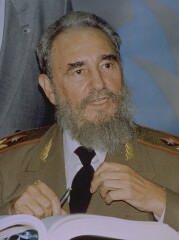
What is Hip Hop?
Fake Hip Hop
Current Issues
Lyrics

Che Guevara
Malcolm X
Huey Newton
Fidel Castro
Karl Marx
Mumia Abu Jamal
Martin Luther King Jr.
KRS One
Dead Prez
R.A.T.M
|
Born: August 13,
1926 (Some sources give 1927)

Castro
was born on a farm in Mayari municipality in
the province of Oriente. He attended good
Catholic schools in Santiago de Cuba and
Havana, where he took to the spartan regime
at a jesuit boarding school, Colegio de
Belen. In 1945 he enrolled at the University
of Havana, graduating in 1950 with a degree
in law. He married Mirta Diaz-Balart in 1948,
but they were divorced in 1954. Their son,
Fidel Castro Diaz-Balart, born in 1949, has
served as head of Cuba's atomic energy
commission. A member of the social-democratic
Orthodoxo party in the late 1940s and early
50's, Castro was an early and vocal opponent
of the dictatorship of Fulgencio Batista. On
July 26, 1953, Fidel led an attack on the
Moncada army barracks that failed but brought
him national prominence. At the time, his
political ideas were nationalistic,
anti-imperialist, and reformist; he was not a
member of the Communist party.
Following
the attack on Moncada, Fidel was tried and
sentenced to 15 years in prison but was
amnestied in 1955. He then went into exile in
Mexico, where he founded the 26th of July
Movement, vowing to return to Cuba in order
to fight against Batista. In December 1956,
he and 81 others, including Che Guevara,
returned to Cuba and made their way to the
Sierra Maestra, from which they launched a
successful guerrilla war. Castro proved
himself a strong leader, he also demonstrated
shrewd political skills, convinced that he
had a historic duty to change the character
of Cuban society.
Seeing
his army army collapse, and unable to count
on the support of the United States, Batista
fled on January 1, 1959, paving the way for
Castro's rise to power. In its early phase,
Castro's revolutionary regime included
moderate politicians and democarts;
gradually, however, its policies became
radical. Castro remained unchallenged, and
the masses--whose living conditions he
improved dramtically--rallied and rally
behind him.
|
|

Socialism
Communism
Nihlism
Capitalism
Facism
Anarchy
Feudalism

Religion
Oppression
Democracy
Free Market
Morality:Ethics
I-Ching
The American Dream
|
|
|
|

Sign
The Guestbook
E-Mail
Strife

|
